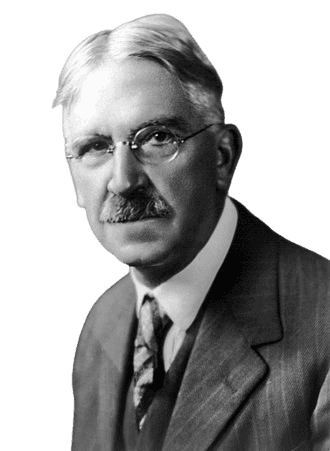Life and achievements
Early life
John Dewey was born in Burlington, Vermont, on October 20, 1859, into a middle-class family. His early learning was at the University of Vermont, where he completed his bachelor's degree in 1879.
From his teacher, Henry Augustus Pearson Torrey, Dewey was inclined towards philosophy, particularly idealism. After teaching in high school, Dewey went to Johns Hopkins University to complete graduate studies. He encountered some scholars there, including Charles Sanders Peirce and G. Stanley Hall.
This is where Dewey developed an interest in switching from the metaphysical to the pragmatic and scientific philosophies of philosophy and psychology. After leaving Pennsylvania, Dewey started his academic career at the University of Michigan, where he was appointed in 1884.
This was when Dewey began to develop the relationship between psychology and education, which later formed part of his ideas on educational theory. Gradually, Dewey's work started getting some attention.
By the early 1890s, he was offered a position at the newly chartered University of Chicago, where his functional psychology and education perspective got an ideal opportunity to grow.
Legacy
John Dewey was one of the most influential educational and philosophical figures of the 20th century. His views on education, especially experiential learning and education in a democracy, are still relevant in many education systems today.
The idea that education is an active, social transaction influenced a number of the student learning processes that are characteristic of the modern classroom, particularly those that were developed by Dewey.
His focus on learning through activities, problem-solving, and teamwork transformed the roles of teachers and learners and turned education into an effective process. In addition to education, Dewey's works in Pragmatism and functional psychology recast twentieth-century philosophy and impacted ethics, aesthetics, and political theory.
His work on democracy and public participation stressed the need to educate people to be responsible and informed citizens. This concept is still relevant to the issues of civic responsibility and social justice.
It is crucial to state that Dewey's impact was global, mainly due to his visit to China and Japan, where he spoke on education and democracy. Progressive educators worldwide appreciated his ideas, and his works can be observed in educational reforms in both the Western and Eastern worlds.
Dewey's work has remained influential to educators, philosophers, and social reformers to date, even after the death of this great scholar in 1952.
Milestone moments
Oct 20, 1859
Birth of John Dewey
John Dewey was born in Burlington, Vermont, to parents who were both literate and encouraged inquiry.
The impressions he formed during his childhood in a relatively simple family defined his democratic views and faith in the transforming force of knowledge.
Dewey's early childhood in a small rural town gave him a practical and helpful view of work, an essential aspect of his educational theory.
Dewey, a young boy, was curious and therefore pursued higher education to satisfy that curiosity.
He started his academic exploration at the University of Vermont and graduated with an emphasis on philosophy.
This early academic success set the basis for his future career as one of the most influential figures in American education and philosophy.
Jan 17, 1896
The University of Chicago Laboratory Schools: the beginning
Dewey established the University of Chicago Laboratory Schools in 1896, an experimental school where he implemented his progressive education.
The school developed into a place to trial new approaches to learning that were in contrast to traditional, bookish methods.
According to Dewey, learners understood better when they were allowed to follow their passion and practice problem-solving skills.
The laboratory schools were pioneers in the country, aiming to develop children's thinking and problem-solving skills.
This was the start of the many changes that Dewey's educational theories brought to the schools in the United States and the rest of the world.
May 16, 1916
The publication of the book Democracy and Education
Dewey also wrote Democracy and Education in 1916, where he expounded on democracy and how education could help in the formation of society.
The book states that schools should be institutions that educate students on how to reason and solve problems so that they can be active members of society.
Dewey thought that education plays a central role in transforming individuals and society.
Democracy and Education became one of the most significant texts in educational theory and practice, helping to shape future generations of educators.
Dewey's ideas concerning the connection between education and democracy are still topical today as educators try to determine how to make the learning process effective for forming active citizens.
Sep 19, 1927
The Public and Its Problems is published
In 1927, Dewey published the political work The Public and Its Problems, in which he discussed the issues of democracy in the modern world.
According to Dewey, voting alone was insufficient for democracy; it needed an informed citizenry that was actively involved.
He urged the need to encourage more communication between citizens, experts, and politicians, stressing the need to educate the public.
This work made Dewey one of the most influential theorists of democracy, and his concept of the public's role still resonates in contemporary political debate.
Another of Dewey's principles is the ability of education to enhance democracy, a component that has been embraced as part of his legacy.
